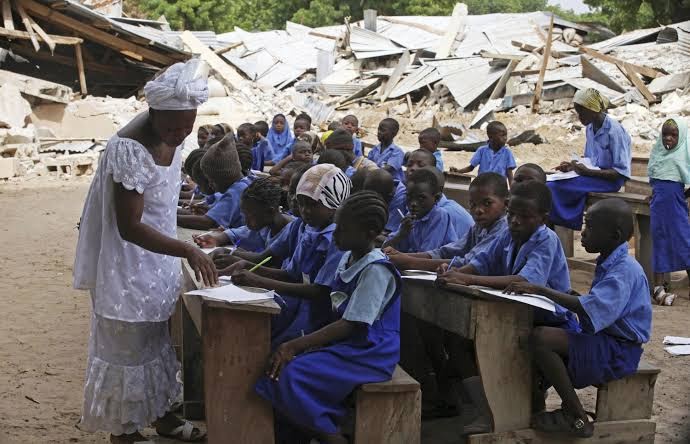Children’s Manifesto: Children Call On World Leaders To Protect Schools From Attacks
The Children’s Manifesto read in a Conference on the Safe Schools Declaration in Nigeria highlights how children face threats and violence while at school, and focuses on the intense fears felt by children in response to these attacks.

Children across the world are making demands to world leaders to make schools safe, deny armies access to schools, and ensure free paths to schools, in a Children’s Manifesto launched on Monday, Oct. 25.
The children’s manifesto authored by 300 children across 10 countries was launched as world leaders met for the 4th International Conference on the Safe Schools Declaration in Nigeria.
The Conference is being held in Africa for the first time, a continent with some of the highest rates of attacks on education in the world.
The Conference is co-hosted by the Global Coalition to Protect Education from Attack (GCPEA), of which Save the Children is a member, in cooperation with the African Union and the governments of Norway, Spain, and Argentina.
Grim picture
The Children’s Manifesto highlighted a grim picture of how children face threats and violence while at school. It also focused on the intense fears felt by children in response to these attacks.
The Manifesto also highlighted how the Children are living in fear when armies come to schools, arrest children, or fire live or rubber bullets at them, as well as when tear gas is used.
Also, the children live in fear when educational institutions are used for military purposes, especially when they hear the sounds of explosions and gunfire subjecting young boys and girls, teachers, and technical staff at school to constant danger.
According to a GCPEA data released last month, attacks on schools and the military use of schools and universities increased by a third globally in 2020. It recorded over 2,400 reports of attacks on education and military use in 2020.
GCPEA recorded the highest numbers of reported attacks on education in Mali and the Democratic Republic of Congo (DRC), and the highest numbers of students and educators harmed in attacks on education in India and Nigeria.
The Manifesto cited children like Mahaman* who forcefully fled Mali with his parents because of the conflict and lost them just after. Mahaman* was forced to stay away from school for a month despite being eager to study.
“I struggled a lot to register him at school because I did not have Niger documentation. I went to Niamey [the capital of Niger] four times to get papers because I was the one who understood the process a bit,” Mahaman* said.
Birgitte Lange, CEO of Save the Children Norway, said the Children’s Manifesto reveals how children are being harmed physically and mentally, by these brutal and prolonged attacks.
“It’s unthinkable that for many children, schools have changed from a safe place to learn to a terrifying place of violence,” Lange said.
The Safe Schools Declaration which was launched in Oslo in 2015 is an inter-governmental political commitment to protect students, teachers, schools, and universities from armed conflict. So far, 112 states have endorsed the Declaration, according to the organisation.
Save the Children is calling on countries who have not endorsed the Safe Schools Declaration to do so, and for those countries to fully implement the commitments in the Declaration, including developing a cost implementation plan.
Support Our Journalism
There are millions of ordinary people affected by conflict in Africa whose stories are missing in the mainstream media. HumAngle is determined to tell those challenging and under-reported stories, hoping that the people impacted by these conflicts will find the safety and security they deserve.
To ensure that we continue to provide public service coverage, we have a small favour to ask you. We want you to be part of our journalistic endeavour by contributing a token to us.
Your donation will further promote a robust, free, and independent media.
Donate HereStay Closer To The Stories That Matter




